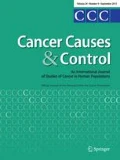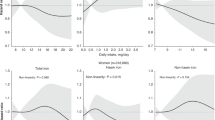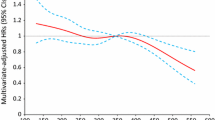Abstract
Although laboratory studies linked zinc and heme iron to colorectal cancer, epidemiologic evidence is limited. We prospectively examined these associations in the Nurses’ Health Study and Health Professionals Follow-up Study. We used Cox proportional hazards regression analyses to calculate cohort-specific relative risks (RRs) and pooled results using a fixed-effects model. We documented 2,114 incident colorectal cancer cases during up to 22 years of follow-up. Compared highest to lowest quintile of dietary zinc intake, the pooled multivariable RRs (95% CIs) were 0.86 (0.73, 1.02) for colorectal cancer, 0.92 (0.76, 1.11) for colon cancer, and 0.68 (0.47, 0.99) for rectal cancer. The significant inverse association between dietary zinc intake and risk of rectal cancer was mainly driven by data in women, although the difference in the sex-specific results was not statistically significant. For the same comparison, the pooled multivariable RRs (95% CIs) for heme iron were 1.10 (0.93, 1.30) for colorectal cancer, 1.06 (0.88, 1.29) for colon cancer, and 1.20 (0.83, 1.75) for rectal cancer. These associations were not significantly modified by alcohol consumption, body mass index, physical activity, menopausal status, or postmenopausal hormone use. Total zinc intake, total iron intake, dietary iron intake, and zinc or iron supplement uses were largely not associated with colorectal cancer risk. Our study does not support strong roles of zinc and heme iron intake in colorectal cancer risk; however, a suggestive inverse association of dietary zinc intake with rectal cancer risk in women requires further study.
Similar content being viewed by others
References
World Cancer Research Fund (2007) American Institute for Cancer Research expert panel. Food, nutrition and the prevention of cancer: a global perspective. American Institute for Cancer Research, Washington
Ma J, Giovannucci E, Pollak M et al (2004) A prospective study of plasma C-peptide and colorectal cancer risk in men. J Natl Cancer Inst 96:546–553
Pisani P (2008) Hyper-insulinaemia and cancer, meta-analyses of epidemiological studies. Arch Physiol Biochem 114:63–70
Giovannucci E, Harlan DM, Archer MC et al (2010) Diabetes and cancer: a consensus report. CA Cancer J Clin 60:207–221
Giovannucci E (2007) Metabolic syndrome, hyperinsulinemia, and colon cancer: a review. Am J Clin Nutr 86:s836–s842
Scott DA (1934) Crystalline insulin. Biochem J 28:1592–1602
Simon SF, Taylor CG (2001) Dietary zinc supplementation attenuates hyperglycemia in db/db mice. Exp Biol Med (Maywood) 226:43–51
Marreiro DN, Geloneze B, Tambascia MA, Lerario AC, Halpern A, Cozzolino SM (2006) Effect of zinc supplementation on serum leptin levels and insulin resistance of obese women. Biol Trace Elem Res 112:109–118
Sun Q, van Dam RM, Willett WC, Hu FB (2009) Prospective study of zinc intake and risk of type 2 diabetes in women. Diabetes Care 32:629–634
Lee DH, Anderson KE, Harnack LJ, Folsom AR, Jacobs DR Jr (2004) Heme iron, zinc, alcohol consumption, and colon cancer: Iowa Women’s Health Study. J Natl Cancer Inst 96:403–407
Larsson SC, Adami HO, Giovannucci E, Wolk A (2005) Re: heme iron, zinc, alcohol consumption, and risk of colon cancer. J Natl Cancer Inst 97:232–233 (author reply 3–4)
Huang X (2003) Iron overload and its association with cancer risk in humans: evidence for iron as a carcinogenic metal. Mutat Res 533:153–171
Cross AJ, Gunter MJ, Wood RJ et al (2006) Iron and colorectal cancer risk in the alpha-tocopherol, beta-carotene cancer prevention study. Int J Cancer 118:3147–3152
Kabat GC, Miller AB, Jain M, Rohan TE (2007) A cohort study of dietary iron and heme iron intake and risk of colorectal cancer in women. Br J Cancer 97:118–122
Kato I, Dnistrian AM, Schwartz M et al (1999) Iron intake, body iron stores and colorectal cancer risk in women: a nested case-control study. Int J Cancer 80:693–698
Wurzelmann JI, Silver A, Schreinemachers DM, Sandler RS, Everson RB (1996) Iron intake and the risk of colorectal cancer. Cancer Epidemiol Biomarkers Prev 5:503–507
Knekt P, Reunanen A, Takkunen H, Aromaa A, Heliovaara M, Hakulinen T (1994) Body iron stores and risk of cancer. Int J Cancer 56:379–382
Balder HF, Vogel J, Jansen MC et al (2006) Heme and chlorophyll intake and risk of colorectal cancer in the Netherlands cohort study. Cancer Epidemiol Biomarkers Prev 15:717–725
Freudenheim JL, Graham S, Marshall JR, Haughey BP, Wilkinson G (1990) A case-control study of diet and rectal cancer in western New York. Am J Epidemiol 131:612–624
Bastide NM, Pierre FH, Corpet DE (2011) Heme iron from meat and risk of colorectal cancer: a meta-analysis and a review of the mechanisms involved. Cancer Prev Res (Phila) 4:177–184
Sesink AL, Termont DS, Kleibeuker JH, Van der Meer R (1999) Red meat and colon cancer: the cytotoxic and hyperproliferative effects of dietary heme. Cancer Res 59:5704–5709
Hambraeus L (1999) Animal- and plant-food-based diets and iron status: benefits and costs. Proc Nutr Soc 58:235–242
Monsen ER (1988) Iron nutrition and absorption: dietary factors which impact iron bioavailability. J Am Diet Assoc 88:786–790
Cross AJ, Pollock JR, Bingham SA (2003) Haem, not protein or inorganic iron, is responsible for endogenous intestinal N-nitrosation arising from red meat. Cancer Res 63:2358–2360
Cross AJ, Ferrucci LM, Risch A et al (2010) A large prospective study of meat consumption and colorectal cancer risk: an investigation of potential mechanisms underlying this association. Cancer Res 70:2406–2414
Willett W (1998) Nutritional epidemiology, 2nd edn. Oxford University Press, New York
Puckett CD (1986) The educational annotation of ICD-9-CM; diseases and procedures tabular lists, report no.: vol I. Reno
Willett WC, Sampson L, Stampfer MJ et al (1985) Reproducibility and validity of a semiquantitative food frequency questionnaire. Am J Epidemiol 122:51–65
Rimm EB, Giovannucci EL, Stampfer MJ, Colditz GA, Litin LB, Willett WC (1992) Reproducibility and validity of an expanded self-administered semiquantitative food frequency questionnaire among male health professionals. Am J Epidemiol 135:1114–1126 (discussion 27–36)
Cho E, Stampfer MJ, Seddon JM et al (2001) Prospective study of zinc intake and the risk of age-related macular degeneration. Ann Epidemiol 11:328–336
Willett WC, Sampson L, Browne ML et al (1988) The use of a self-administered questionnaire to assess diet four years in the past. Am J Epidemiol 127:188–199
Feskanich D, Rimm EB, Giovannucci EL et al (1993) Reproducibility and validity of food intake measurements from a semiquantitative food frequency questionnaire. J Am Diet Assoc 93:790–796
Salvini S, Hunter DJ, Sampson L et al (1989) Food-based validation of a dietary questionnaire: the effects of week-to-week variation in food consumption. Int J Epidemiol 18:858–867
Cox DR (1972) Regression models and life-tables. J R Stat Soc 34:187–220
Institute SAS (1991) SAS/STAT software: the PHREG procedure: preliminary documentation. SAS Institute, Cary
Hu FB, Stampfer MJ, Rimm E et al (1999) Dietary fat and coronary heart disease: a comparison of approaches for adjusting for total energy intake and modeling repeated dietary measurements. Am J Epidemiol 149:531–540
Cochran WG (1954) The combination of estimates from different experiments. Biometrics 10:101–129
DerSimonian R, Laird N (1986) Meta-analysis in clinical trials. Controlled Clin Trials 7:177–188
Solomons NW (1986) Competitive interaction of iron and zinc in the diet: consequences for human nutrition. J Nutr 116:927–935
Whittaker P (1998) Iron and zinc interactions in humans. Am J Clin Nutr 68:442S–446S
Chadha VD, Goel A, Dhawan D (2011) Regulatory role of zinc on the biokinetics and biodistribution of (65) Zn during the initiation of experimentally induced colon cancer. Nutr Cancer 63:212–217
Dhawan DK, Chadha VD (2010) Zinc: a promising agent in dietary chemoprevention of cancer. Indian J Med Res 132:676–682
Epstein MM, Kasperzyk JL, Andren O et al (2011) Dietary zinc and prostate cancer survival in a Swedish cohort. Am J Clin Nutr 93:586–593
Hunt JR (2003) Bioavailability of iron, zinc, and other trace minerals from vegetarian diets. Am J Clin Nutr 78:633S–639S
Sinha R, Cross A, Curtin J et al (2005) Development of a food frequency questionnaire module and databases for compounds in cooked and processed meats. Mol Nutr Food Res 49:648–655
Acknowledgments
We are grateful for all participants in the Nurses’ Health Study and Health Professionals Follow-up Study for their continuous contribution and support. This work was supported by the NIH grants CA87969 and CA55075.
Conflict of interest
None. The funders had no role in the design and conduct of the study; collection, management, analysis, and interpretation of the data; and preparation, review, or approval of the manuscript.
Author information
Authors and Affiliations
Corresponding author
Rights and permissions
About this article
Cite this article
Zhang, X., Giovannucci, E.L., Smith-Warner, S.A. et al. A prospective study of intakes of zinc and heme iron and colorectal cancer risk in men and women. Cancer Causes Control 22, 1627–1637 (2011). https://doi.org/10.1007/s10552-011-9839-z
Received:
Accepted:
Published:
Issue Date:
DOI: https://doi.org/10.1007/s10552-011-9839-z




